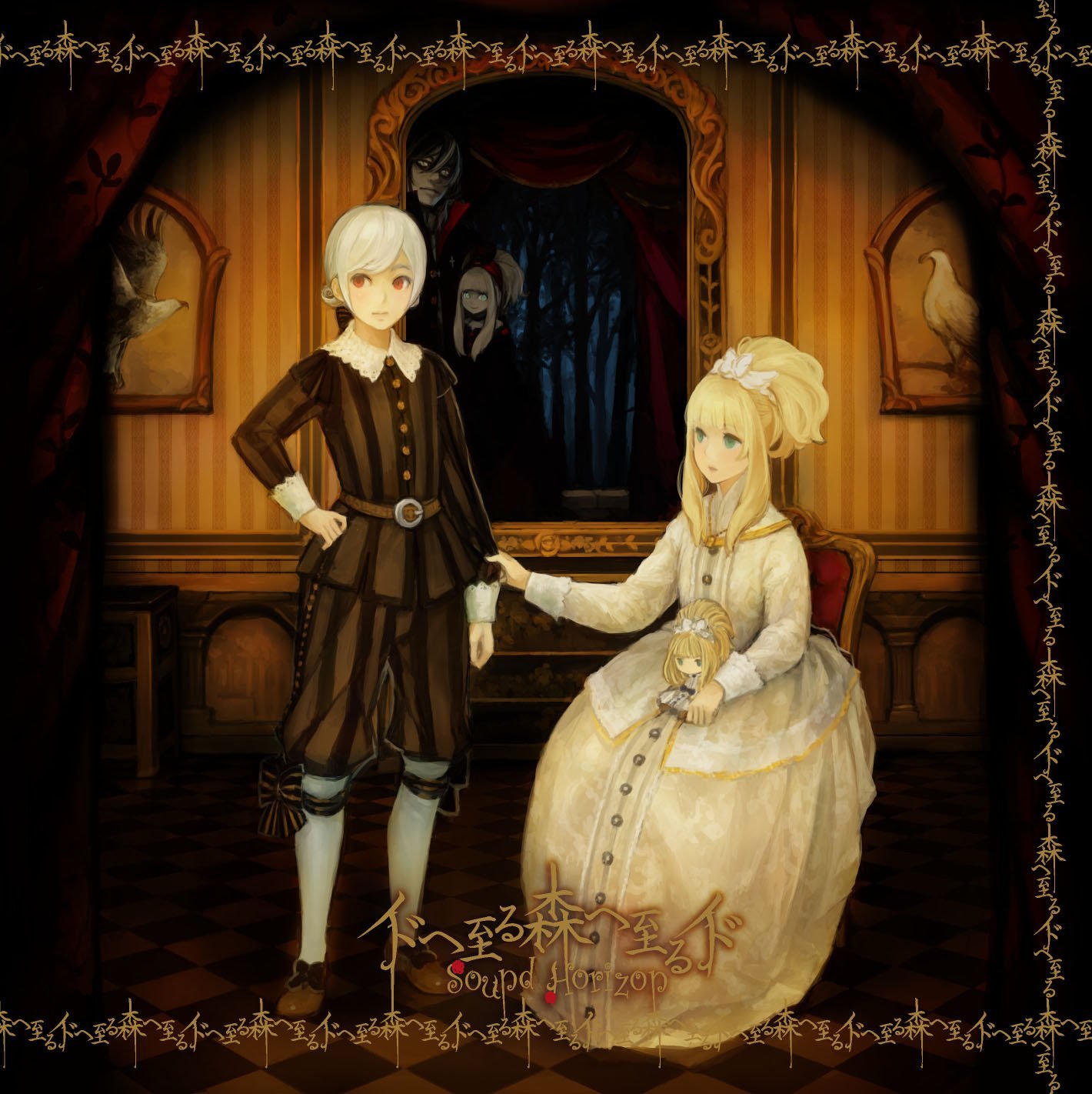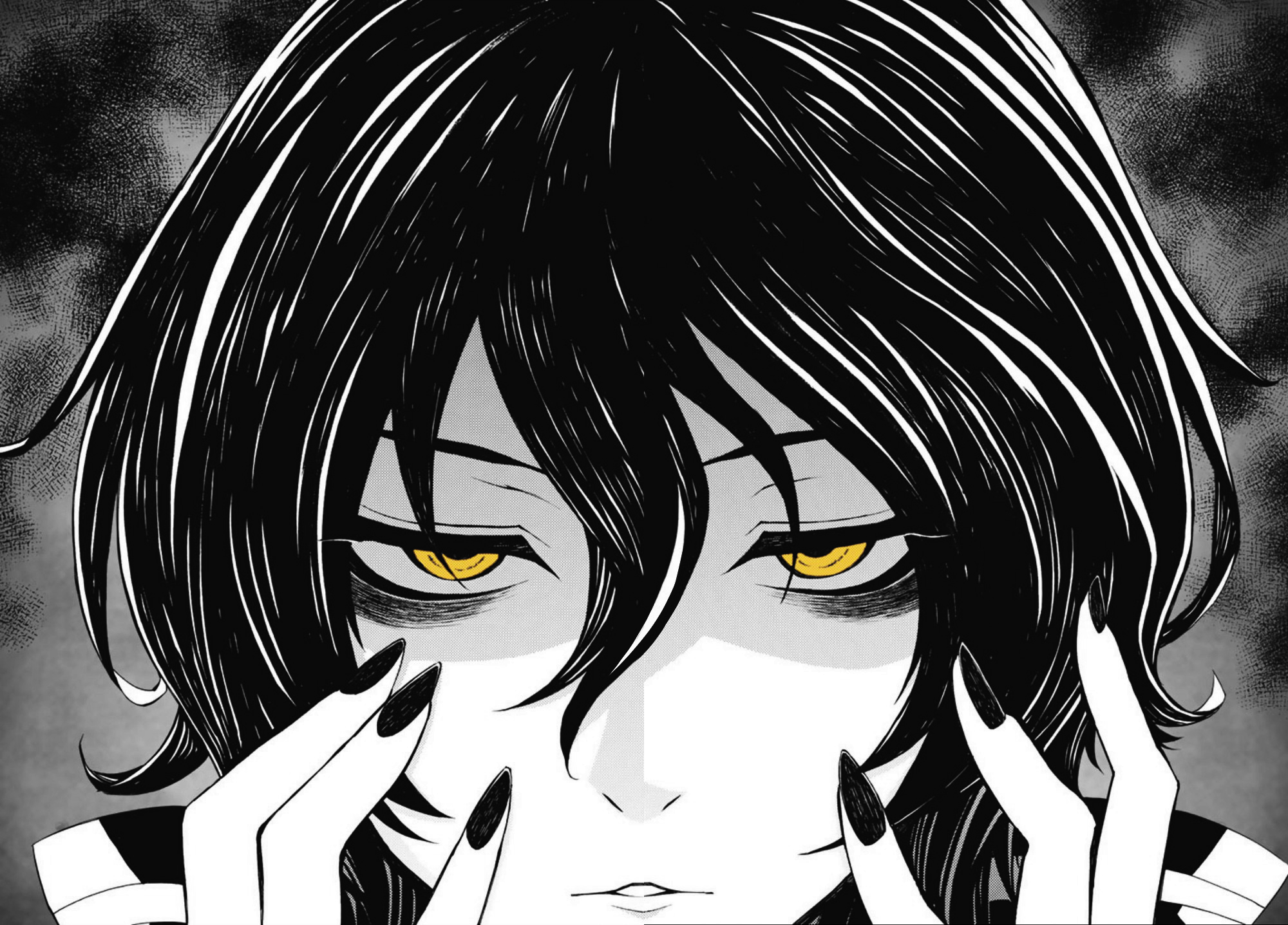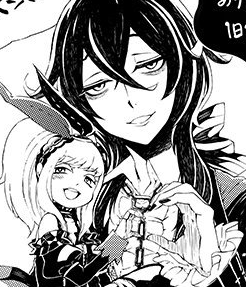wer ist märchen von friedhof?
[who is märchen von friedhof?]
We just don't know.
Märchen von Friedhof is the protagonist of Sound Horizon's first prologue maxi single, Ido e Itaru Mori e Itaru Ido, and the accompanying seventh story album, Märchen, the latter of which runs for seventy-seven minutes. Although portrayed by Revo, he is rather interestingly credited as himself for his vocals, and he is also credited as himself for his appearance in the live show procording.
To summarize the events of Mär's life accurately is a challenge due to the nature of Sound Horizon's style of storytelling, especially in respect to the narrative in which he is so central. Many details are deliberately obfuscated or left vague, and as a consequence a number of fairly important plot points are a matter of individual interpretation. Though the songs are the only canon material, there are also two official manga which display wildly differing takes on the narrative and these are also an influence on my thinking. To put it in Revo's terms, the Horizon I'm about to show you is a matter of my own interpretation, but I'm a fallible narrator, too. You're free - and, in fact, encouraged - to enjoy the original work yourself and discover your own Horizon.

If you don't, how will you understand this?
Märchen began life in the forests of Thüringen, Germany, in 1340 as März von Ludowing. His mother, Therese von Ludowing, was an experienced midwife and doctor, and she was quite protective of him and very loving, although a bit formal and stiff. He was born blind, but regardless managed to lead a fairly active lifestyle without significant trouble. He struck up his first friendship with a young girl named Elisabeth von Wettin, herself sheltered due to her social status as nobility and poor health. Therese seemed to approve heartily of their friendship, perhaps in part because she had saved young Elisabeth from the brink of death in her infancy and held some lingering fondness for the girl.
Things took a strange turn when Mär happened to fall into a particular well. He was uninjured, thankfully, but something had changed in him, and he was no longer blind. The incident shook and disturbed Therese greatly, and Mär's seemingly miraculous change along with Therese's medical expertise and choice to live in the woods created some ugly rumors: mainly, that Therese was a witch, and that she had restored her son's eyesight through nefarious means. The spread of these rumors in the wake of this strange event prompted her to decide to move to another town, and, of course, to take Mär with her. She allowed him the opportunity to visit Elisabeth one last time in order to say goodbye.

März and Elisabeth.
März had a very emotional parting with Elisabeth. She entrusted him with her favored doll, Elise, and bade him promise that he return with her one day; he of course did so, and began the walk home. On the way, he was approached by two men who asked to see his mother. The men were witch hunters, and it was quite clear they had nefarious intentions; März, however, had never before met a person who treated him unkindly, and had no inkling that they could have possibly meant any harm. Accordingly, he led them home with him without complaint. The witch hunters immediately attacked Therese, and pushed März himself into the well on their family property, where he drowned and died. Therese, livid, drew a sword and nearly managed to kill both witch hunters, but was unfortunately overpowered and captured.
Subsequently, Therese was tried as a witch and sentenced to burn at the stake (portrayed in the live concert as a cross), despite her total innocence. Enraged, she decided she may as well become a witch, and while on the pyre cursed the world.
the well of ID called out to him.
Märchen awakens.
A man named Märchen von Friedhof awakens at the bottom of a well with a doll in his arms. He doesn't remember who he was before. All that he knows is that he's dead, and that he's consumed by a strong desire for revenge. This impulse cannot be denied. He takes up a baton and begins to conduct a song of grudges. Seven murdered girls sing in his choir, and he satisfies their impulses for revenge in order to vicariously satisfy his own. Many of the women, or those close to them, are perhaps familiar figures: a nun who enlists the aid of two abandoned children lost in the woods, a young girl working for a nefarious innkeeper, a princess with a monstrous stepmother, a young lady who works hard all through winter, a princess who sleeps for an age, a woman whose curiosity does her few favors, and a woman who refuses to marry.
When Märchen encounters Elisabeth once more, it is near the end of his revenge tragedy. Though they've long since grown to adulthood, Elisabeth never forgot Mär's childhood promise - she has outright refused to marry due to her dedication to März, even knowing he is long dead. Her brother is infuriated, and orders her death for her perceived insolence. To Mär's surprise, she declines his offer of vengeance, claiming that his having returned is enough to satisfy her. She reveals to him their childhood connection, and his memories return. They embrace, and she urges him to move on before doing so herself.

Elisabeth embraces Mär.
The experience deeply affects Märchen. He laments the path he had been set on from the beginning and the things he was denied. He expresses his desire to be happy and at peace with Elisabeth and his desire that the rest of the seven women for whom he had conducted his revenge tragedies also find peace. Believing in the possibility of such a future beyond his grudges, he leaves behind his impulse for revenge and moves on.

die Geschichte des Märchen
[the history of the fairytale]

You may have noticed I gave a very precise year for the date of Mär's birth. Though it's not stated in canon, there are a number of historical references that make a certain period of German history the most likely candidate for the plot of Märchen. The historicity of much of the narrative is admittedly rather tenuous, but what do the dead care for time and dates, anyway?
The first detail of note is one which pertains to the setting. Märchen comments on März and his mother living in the forest of a village which was ravaged by the Black Plague, leaving the majority of its inhabitants dead. It's possible the Plague passed long before their arrival, but this does narrow the time period considerably in conjunction with two other details - Therese was a renowned medical professional who treated a large number of sick in the short time she and März lived in the area, and the witch-hunters wore (admittedly rather ahistorical) plague masks in the live performance. These details in conjunction with the explicit mention of the plague would support the idea that März would have to have been born around the time of one of the major plague outbreaks in the Middle Ages.
"Wait, ONE OF the major plague outbreaks?", I'll pretend you're asking. Yes! Though the largest outbreak of the Black Plague raged from the mid-late 1340s to the early 1350s, there were a number of resurgences throughout Europe for centuries. The presence of plague is not enough to narrow down the time period in which März was born, but a number of other details further solidify the era. These have to do with the names of the characters, including März himself.
The von Ludowings were a real family - Therese and März specifically are, of course, fictional, but the von Ludowing family controlled the landgraviate of Thüringen until the 1240s. Therese claims, "Though I have fallen, the blood of the Landgraves still flows in my veins!" This is likely in reference to an unspecified troubled past Therese led prior to Mär's birth, but may simultaneously be a nod to the fact that the von Ludowing family had long since lost control of Thüringen.
The next bloodline to control the landgraviate was the von Wettin family, who ruled during the 1340s. Elisabeth von Wettin is mentioned to hold a great level of status, with Therese going so far as to refer to her as a princess and her mother as a queen in a section of narration concerning the incident in which Therese saves Elisabeth from potentially fatal illness in her infancy. Given Elisabeth's family enjoying such elevated status and the explicit mentions of the Black Plague, as well as the inclusion of related imagery such as plague masks and rats, it's fairly safe to say the timeframe of the narrative spans between the 1340s and 1360s or even early 1370s, given Mär and Elisabeth age into adulthood.
There are a few complicating factors in this timeline, however. The first revenge tragedy, featuring the murdered nun, depicts an incident of religious conflict between Catholics and an unspecified other group, probably Lutherans. The second revenge tragedy also depicts a conflict - a large-scale rebellion of many peasants spurred on by a religious leader, and one that ends poorly. Both these tragedies are likely referencing the German Peasants' War, which spanned from 1524 to 1525 and involved both class-motivated and religiously-motivated conflicts. In addition, Lutheranism, the first branch of Protestantism, did not exist until 1521, making any similar religious conflicts before the 16th century outright impossible. Why these revenge tragedies are apparently set two centuries in the future to the other major events of the narrative is unclear, although given the entirety of the story is explicitly framed as a fairytale with an unreliable author, perhaps I'm quibbling a little too much over details. But my id can't be denied, either! Hopefully one day I'll make sense of it all...

persönliche Gefühle
[personal feelings]


Being so cute is kind of offensive.
I first started getting into Sound Horizon in 2017 when an old friend of mine showed me and a couple other friends Roman and Moira. It was a little confusing at first - Revo has a very particular style of storytelling that I think requires a bit of acclimation to - but I was very taken with the production value, and I wanted to know more about all the stories Revo had to tell. We started watching more Sanhora together regularly, with her explaining anything I found confusing. Late that summer, I first saw Märchen.
I was taken with him instantly. I can't say what drew me to him precisely anymore, if I ever knew - he just had a quality I really, really liked, and I was constantly wanting him to show up onstage again. I was fascinated. The narrative was one that ended up feeling shockingly poignant to me - I felt the entire time I watched that he was perfectly justified in all that he was doing, and so it wasn't only a shock to Mär when Elisabeth refused to participate in his pursuit of vengeance. I related very deeply to both his sense of compassion and justice and to his arguably disproportionate and petty sense of retribution, and he made me feel very seen and understood in a way that was remarkably touching. His explicit decision to heal and to eschew the cycle of violence into which he had been pulled made me reflect, and it made me want to do better in my personal life. Most of all I wanted him to be able to experience the happy future he so earnestly desired, and on August 9th of that year I decided I wanted to be the person who gave it to him.
At the time of writing it's been five and a half years since that first time I saw him. He changed my life permanently in a way no other character ever has, and in a way only my closest and dearest friends have ever matched. There's a certain sacredness in that that makes it difficult to express precisely how I feel - in part I want to keep it all locked up and private, to let it stay pure and secret and exclusively between him and I. And five years is a very, very long time, although some days it hardly feels that way. How do you summarize five years - all the things that changed, all the things that didn't, all the lessons you learned and the people who came and went? I'm not the same person I was when I first met him any longer.
I suppose what I can say is that I'm convinced I'm still alive because of Märchen, and I love him more than anything. He's such a central part of my life I can't imagine what it would be like to be without him, nor do I want to. And I hope he's happy. I want him to always, always be happy.
